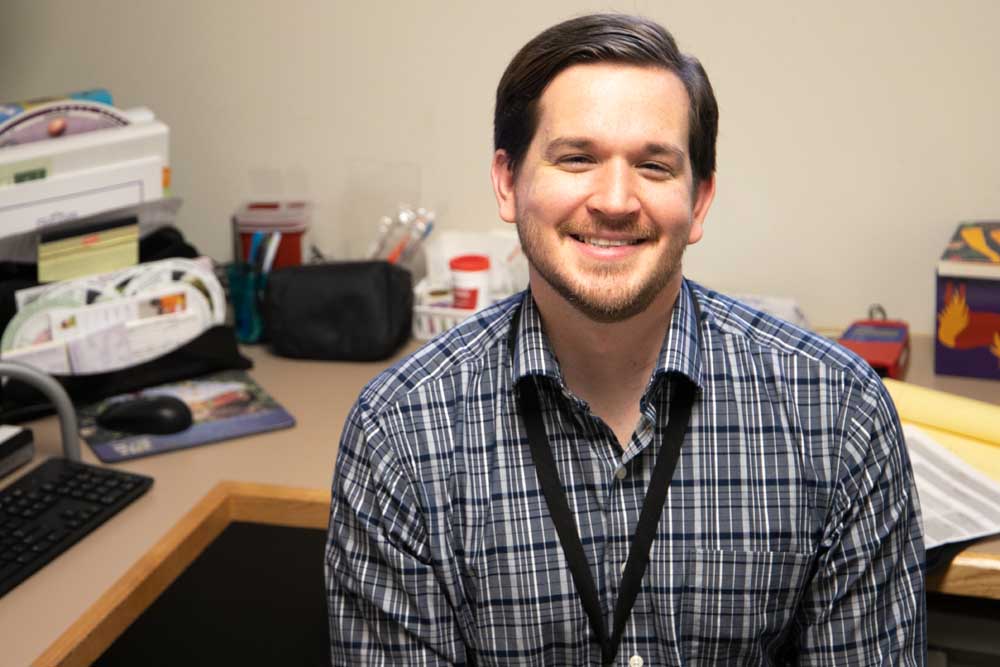Q&A: Pacific County health officer discusses Omicron, boosters, hospital worries
Published 11:27 pm Sunday, January 2, 2022

- Dr. Steven Krager, the county’s public health officer, was recognized for outstanding work during the height of the pandemic.
PACIFIC COUNTY — Omicron is fueling a record surge of infections in Washington state and nationally, which are expected to soar higher still in the first month of the new year.
With cases in Pacific County rising at a sharp rate over the past week, the Observer chatted with county health officer Dr. Steven Krager on Dec. 30 to get his insight on the evolving situation.
The conversation spanned a number of pandemic topics, including what scientists and health officials have discovered about Omicron since it first emerged in November, what they’re still trying to learn about it, the effectiveness of vaccines and boosters against the new variant, the threat Omicron poses to local and regional hospitals, and whether people should consider making adjustments to their daily life.
The following conversation has been edited for length and clarity.
Chinook Observer: In what ways does the Omicron variant differ from Delta or other previous strains of the virus?
Steven Krager: Probably the most striking difference with Omicron compared to previous variants is just how infectious it is. We said the same thing about Delta, but this is actually even worse. It’s probably three times more contagious than Delta … seeing something like [Omicron] and seeing how quickly it spreads and doubles, that’s the thing that probably stands out the most and why public health officials and healthcare officials are so worried, because it’s going to infect a lot of people really quickly. In looking at other countries and seeing what’s happening, and in Washington even, Omicron basically became the dominant variant in three or four weeks after being introduced; Delta took a lot longer than that.
CO: There’s been talk, and hope, that Omicron appears to cause more mild illness than Delta. Can you share what you know about that?
SK: What we’re still learning about is the severity of Omicron. There’s been some promising studies from South Africa and the UK, which were hit earlier than us, that show that it’s probably causing less severe illness. I think it’s important to note that that’s on average; 40% less severe than Delta is kind of the number that gets thrown around, which [Delta] was already more severe than the original strain — so actually it’s probably closer to the original strain in terms of severity. So it’s still not great, and it’s not like we’re talking about severity in terms of the common cold or influenza. On average, it’s causing much more severe disease than that.
The thing that complicates it further is covid-19 has been around for two years now, going in waves around the world; a lot of people have been infected, and then obviously we’ve had a lot of people vaccinated. So what that translates to in terms of how many people truly have no immunity to covid-19 at all that would be at risk of severe disease, that’s kind of the big unknown.
But some of our predictions and models are concerning, because even if 25% of the population has no immunity, those people are probably going to get infected with Omicron. A number of those people will get severely ill. And then on top of that, we have people who were previously infected but are high-risk and not immunized; Omicron readily and very easily reinfects people, so previous immunity from previous infection doesn’t seem to do a whole lot … Those people are going to be at risk.
CO: During the peak of the Delta wave, the two hospitals in Pacific County sometimes had trouble transferring patients with covid-19 to other hospitals that could provide more specialized care. How much risk does Omicron and a potential wave of cases present to our local and regional hospitals?
SK: I do have that concern about Pacific County. It’s unique in Pacific County because hospital resources are pretty limited, so there’s not a lot of wiggle room there, right? The other problem that goes along with that is everyone’s going to be in the same boat, so it’s not like Pacific County is going to have a ton of options about where to send people. That has impacts for people in Pacific County; and it’s not just people that might get covid, it’s anybody who might need to go to the hospital.
We’re hearing stories — and this happened with previous surges in other places — where bad outcomes happened to people who were having to wait too long for a procedure, or having to wait too long in the ER because emergency rooms were so filled up. That’s happening in other places and I really hope we can avoid that happening here, but it’s certainly a concern I have.
The thing that provides a little bit of hope is that, at least in South Africa, [their Omicron surge] peaked rather quickly. It’s hard to say whether that’s going to happen here or not … their population is a whole lot younger, and even though their vaccination rate is lower they may have — based on previous waves of infection — overall more people with at least some immunity … That may happen, and it may be that we have trouble at our hospitals for a couple of weeks or something like that. That’s a huge problem, but hopefully it won’t last weeks and weeks or months and months at a time.
CO: What risk does Omicron pose for people who have been vaccinated against covid-19?
SK: If you are vaccinated and especially if you’re boosted, individually the risk is pretty low, especially the younger you are. Personally, I’m not super worried about getting infected with Omicron because I’m boosted … even if I did, I’m not worried about getting severe illness; I’m worried about infecting other people in my life who either can’t be vaccinated [like young children], or are higher risk and potentially may be an unlucky vaccinated or boosted person who still ends up having severe illness.
People who are vaccinated but are especially vulnerable — people who are immunocompromised, and people who haven’t gotten boosted and are elderly or have significant medical conditions — those people are still at risk as well.
CO: How much of a difference in the chances of developing a severe case of Omicron is there between people who are vaccinated, people who are vaccinated and boosted, and people who are unvaccinated?
SK: Even if you get infected, and you’ve been vaccinated, you’re going to have a less severe illness. That’s been true of other vaccines in the past as well; whooping cough is super common, and infants that are able to be vaccinated, even if they get whooping cough, are just less likely to be hospitalized. That’s the same principle that’s happening here.
If you have two shots of Pfizer or Moderna, you are still somewhat protected from infection — it looks like about 35% compared to no vaccination at all. If you get boosted with one of those we’re talking about 75% protection — which is what some of our other vaccines look like — and that’s just preventing symptomatic infection at all. That’s actually pretty good if you’re boosted; not as good as the 95% we saw in the original strain, but again, not bad. Those numbers get better when we’re talking about severe illness and preventing death … If more people get boosted, we will blunt this surge of infections and severe illness.
I’ve seen a lot of metaphors for this, like wearing a seatbelt in a car is not going to prevent a car crash from happening, but it will protect you from serious injury and death. A bulletproof vest is not going to prevent you from getting shot, but it will prevent you from dying if you get shot. Those are the same kinds of principles. Of course I would love for the vaccine to be perfect and for no one to ever get any sort of breakthrough infection, but what we care most about is preventing severe illness and death — and potentially long-term covid symptoms, which the vaccines also seem to provide some protection against. For those purposes, the vaccines are still doing very well.
It still makes much more sense to get vaccinated even if you’ve been previously infected, there’s been lots of data around that. People say “Well, I have natural immunity,” which I don’t like that term. I would call it infection-induced immunity, and you’re still much better off getting vaccinated in that case. You’re gonna be less likely to get infected, you’re gonna be less likely to get severe illness, and any chance of some super rare side effect from the vaccine is so low. You’re just much better off getting vaccinated than risk getting reinfected and having a bad outcome. The chances of having a bad outcome from getting reinfected is much higher than any sort of rare side effect you might have from vaccination.
CO: Do you think people should be adjusting their ‘normal’ pandemic routines, whether it’s eating out at restaurants, traveling or hosting guests, the type of mask they’re wearing, etc?
SK: I’ve gotten this question a lot, in terms of what do we do about [Omicron]. In terms of daily life, I think it comes down to your risk tolerance and that of the people around you. If you mostly just see young, healthy people who are vaccinated, in smaller groups, I’m not sure it makes sense to change your behavior a ton. You can take some extra precautions: You can wear masks more often, you can test in group settings if you’re having a get-together … If you are going to go to a crowded party or something, then a mask really makes sense. Personally, I’m not going to go to a crowded indoor party. The amount of Omicron we’re seeing spread, it’s just kind of everywhere.
[If you are or have people in your life like] those who are immunocompromised and those who can’t be vaccinated like kids under 5 — and a lot of [eligible] kids who just aren’t vaccinated — these are the things you kind of need to think about. It’s not that you shouldn’t get together at all, just be a little more cautious on how to increase safety in those settings: Open a window, have everyone test beforehand, use an air purifier. These are all kinds of things that will decrease risk.
I do think it makes sense to think about a higher quality mask right now, for anyone who’s just going out and about and mixing with people in an indoor setting — even if it’s just grocery shopping or something like that. An N95 or a KN95 mask is going to be your best bet. If you don’t have access to those types of masks, then think about how well a cloth mask fits you: Whether it fits against your face, how many layers you have — three or four is typically best. And you can have a double-mask as well, which helps push the cloth mask against your face and keep it more sealed … If you have an N95 or KN95 mask, now’s the time to start wearing them.
CO: What concerns you the most about Omicron?
SK: I’m just most concerned about what January and early February look like for our hospital system and also just for the number of people who are going to get sick and unfortunately may die from covid-19. That’s what bothers me the most. It’s not a foregone conclusion about what’s gonna happen … but I do worry we’re gonna have some bad outcomes locally and in Washington where we just have a lot of really sick people.
CO: What are you most hopeful about?
SK: While it seems kind of dire with the case numbers we’re seeing with Omicron, we’re still in a much better place than we were last winter with access to the vaccines that we have, that are effective, that are working and that are safe. That’s what provides me with the most hope. We have these vaccines that are readily available, are working well and have saved countless lives already and are going to continue to save lives. On top of that, we have access to similar technology that if a variant shows up and ends up causing more severe disease, hopefully we can respond to that rather quickly.
When I compare where we were at last year, when we had a terrible winter across the country and lots of people dying from covid-19, lots of hospitalizations and just not a great way to prevent a lot of that. We had methods, but unfortunately people were tired of doing them so we couldn’t do those anymore. Now we have vaccines that’s main purpose [of preventing severe illness and death] are working very well.






